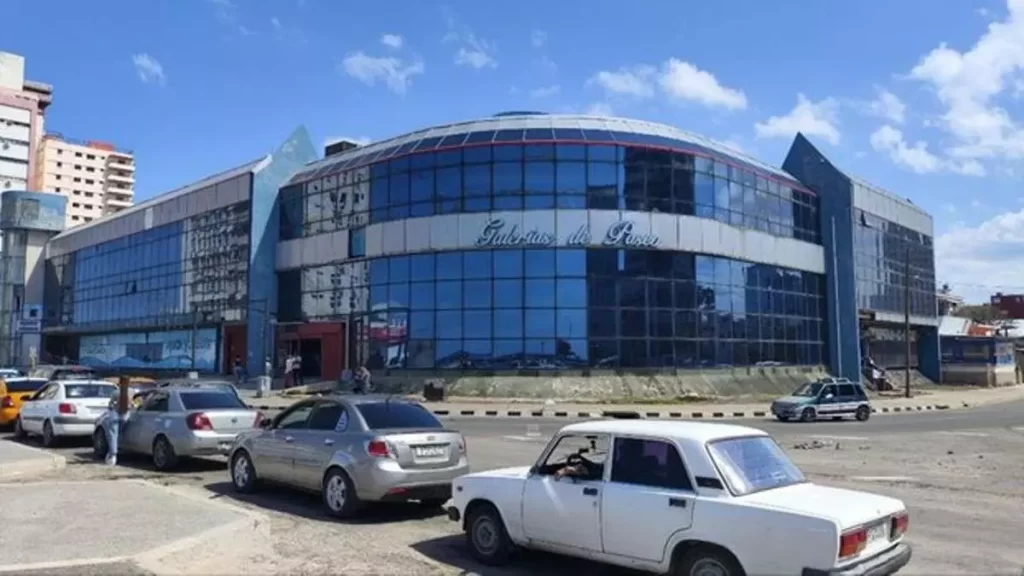
![]() 14ymedio, Natalia López Moya, Havana, 24 February 2024 — Careful!” a woman managed to say this Friday to a child who was rushing along the entrance ramp of the Paseo Galleries, in Havana’s Vedado district. The floor slabs, full of holes, forced customers going to the market, located on the first floor, to walk gently to avoid falling or spraining an ankle. The deterioration of what was one of the consumer palaces of the Cuban capital in the 90’s seems to know no limit.
14ymedio, Natalia López Moya, Havana, 24 February 2024 — Careful!” a woman managed to say this Friday to a child who was rushing along the entrance ramp of the Paseo Galleries, in Havana’s Vedado district. The floor slabs, full of holes, forced customers going to the market, located on the first floor, to walk gently to avoid falling or spraining an ankle. The deterioration of what was one of the consumer palaces of the Cuban capital in the 90’s seems to know no limit.
Everywhere you look you will only find destruction, grime and peeling paint. With barely any lighting at its entrance, the cloudy day was of little help for those who entered the three-story establishment, located right across from the luxurious Cohiba Hotel and a few meters from the ocean-front wall of the Malecón. Most of those who arrived went to the market — which requires payment in freely convertible currency (MLC) — on the first floor, managed by the Cadena Caribe of Cuba’s GAESA* military conglomerate.
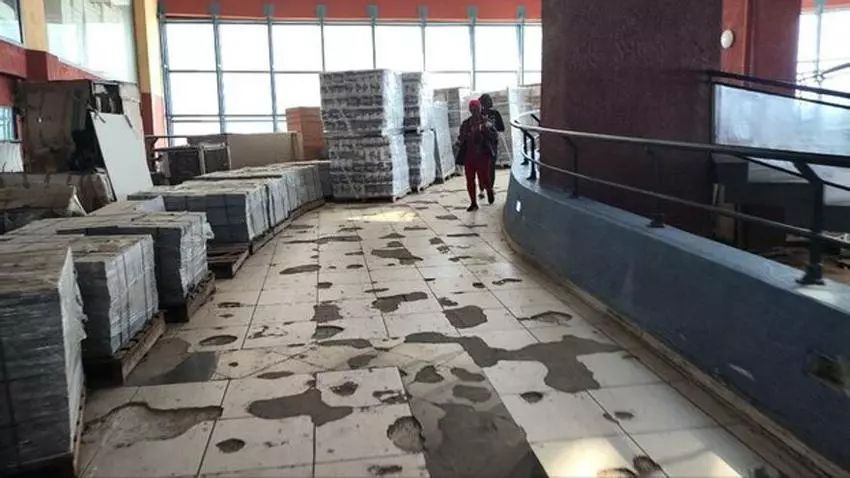
Inside the store, the floor is in better condition and at least the lamps have most of their bulbs working, but the presentation of products is more reminiscent of a warehouse than a store. “Everything is piled up, in order to find a price sometimes you have to go among the mountains of bags or cans,” complained a customer who came in search of powdered milk. In the back, the meat sales area had a small line.
“This place sucks, but it’s what I have closest to my house and I came here to buy butter,” commented Moraima speaking to 14ymedio; she is a retiree who receives remittances on her MLC card from her son, who resides in Sweden. “This small bar [90 grams] costs 1.70 MLC,” the woman criticized. Behind her, the price board announced “baby octopus” at 16 MLC per kilogram; seven units of Asturian blood sausage for 4.25, and 200 grams of smoked salmon for 35.
“Everything is very expensive and the place is depressing. They charge in foreign currency and abuse in Cuban pesos,” said Moraima. “This cart with oil, peas, a package of chickpeas, tomato sauce, flour, butter and a little ham is already costing me more than 50 MLC,” she explained to this newspaper. “With this, I’m spending more than half of what my son sends me monthly; he has to work very hard to send me 100 MLC.”
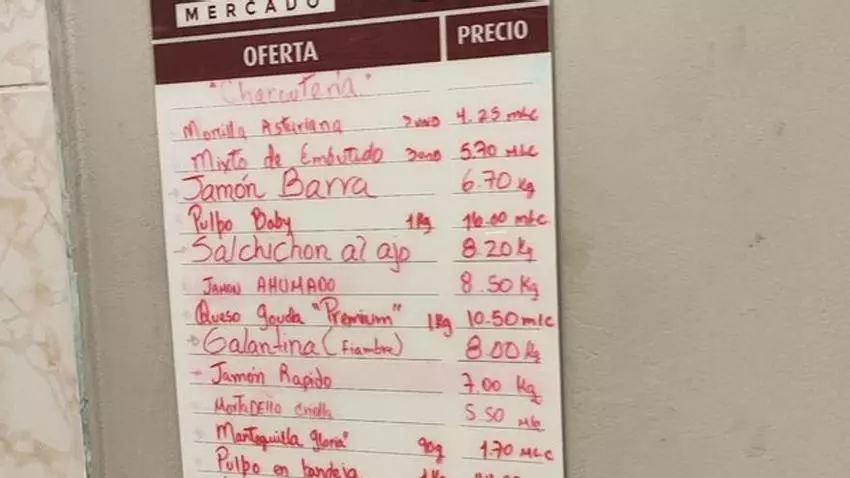
“All this is in this condition because they know that even if it is a dark cave, people are going to have to continue coming here to buy,” another customer said out loud while waiting for an employee to appear to open a bag with packages of children’s candy. “They say that until they read the barcode, they can’t tell me how much it costs,” he was losing his patience.
“They don’t sell anything fresh and there is a disgusting smell in the market, it smells like rotten fish, I don’t know how they can be open like this,” questioned another buyer. “I used to come here, I even bought a Spanish pressure cooker years ago that turned out to be very good, but this place doesn’t even look like that anymore, this is in total decline.”
For those who do not want to risk their lives going down or up the access ramp to the supermarket, there is still the risk of taking the stairs with several broken steps on their edges and which has not seen a broom come by in months, perhaps years.
The Jazz Café, located on a mezzanine with a stunning ocean view, now resembles a haunted house, full of dust and cobwebs. “It closed a little before the pandemic and never reopened, a shame because this was always full and it was a unique place in Havana,” lamented a worker who was trying to push a cart full of goods being careful so the wheels wouldn’t fall into the ramp’s potholes.
A meeting place for musicians, national and foreign clients looking for company, the Jazz Café charged about ten convertible pesos (CUC), in the days when the CUC was still in circulation, which included a basic dinner and a musical show. The place remained full past midnight, especially on weekends, and the access staircase became an improvised catwalk of young girls showing themselves to the tourists.
With a careful design and sculptures that imitated jazz players in full improvisation, the Jazz Café became a unique space in the Havana night. “The proximity of the Cohiba Hotel guaranteed that this would be full, but right now there is little tourism and those who come asking if the club is open what they find is this, an abandoned place,” acknowledged a taxi driver who charged 2,000 pesos for a ride to the nearest municipalities to those who left the supermarket this Friday.
For the most empowered customers, Galerías Paseosreserves its boutique shopping area for dresses that exceed 200 MLC and sneakers from famous brands. But even those places of supposed glitz do not escape the dirt and crisis of the environment. Thus, Adidas shoes alternate with stained glass, expensive perfumes with cracked floors, and leather purses with stained walls.
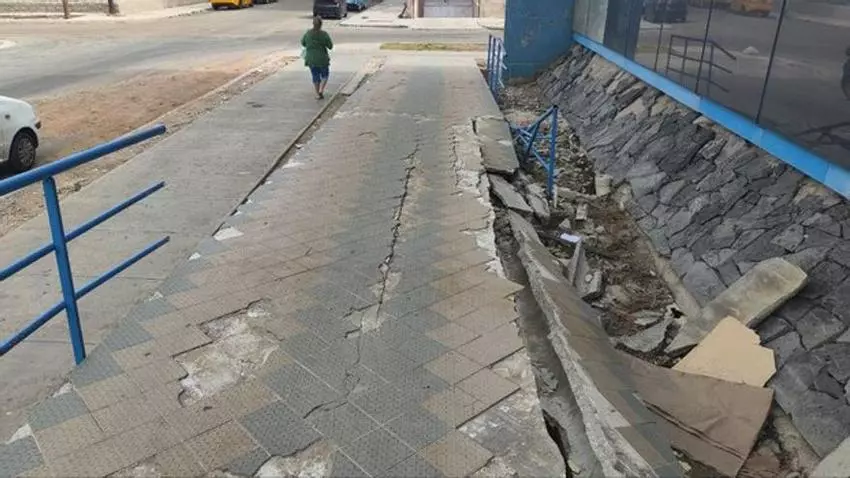
At least three of those businesses were closed this Friday without explanation. With the lights off inside, the stores, located on the third floor, gave the impression of having been abandoned with the merchandise inside, and no employee of the complex could attest as to when they would reopen. “Come by on Tuesday or Wednesday to see if they are selling again”, a custodian suggested to a teenager who inquired about the shoe shops.
The workers’ faces are also streaked with apathy. What was once a very attractive place to work has ceased to generate interest. “Everything is paid by card, customers almost never leave tips, and when they do, it is in pesos,” acknowledges an employee who this Friday helped a couple carry their purchases to the car.
“Many people have also left because they received their parole visa or left by way of the volcano route,” the man acknowledged. When foreign currency stores opened for Cuban customers in the 90s, working in one of those stores was, automatically, the beginning of starting to be part of a wealthier social class, but now the situation is very different.
“Inspections, hard work and little encouragement,” the employee summarized the situation of the Galerías Paseo workforce. “This has gotten really bad, I’m looking for a job in one of those MSMEs that pay better and where there isn’t as much drama as here, because I might as well have to stay until the next day for an audit than to put up with complaints from a client who is absolutely right, because what they should do with this place is to shut it down, it cannot continue operating in these conditions.”
In the bathroom on the top floor, only the one for women was open, which had three cubicles and at least one of them was out of service. A cardboard over the bowl with a bucket on top prevented the use of the toilet and the smell that came from inside made some of the urgent customers who came to that area give up. There was also no water supply for hand washing or flushing toilets.
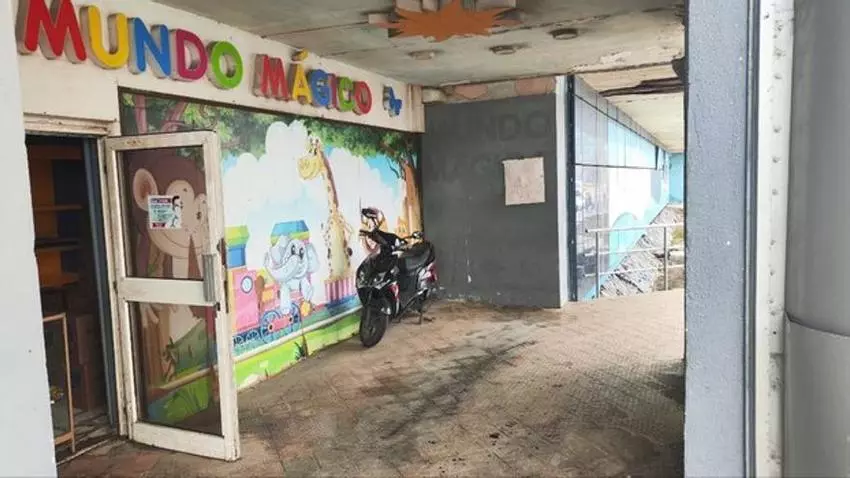
But the best “surprise” was at the exit. A colorful sign welcomed Mundo Mágico, a place that a few years ago was the children’s store. “No, we no longer sell toys here, now we only sell the ‘basic products module’ [from the rationing system] for the people of this area,” an employee responded grumpily to a clueless customer who was looking for some dolls.
Above the worker’s head, blue, red and yellow letters recalled that period when Galerías Paseo was the consumer palace of a Havana that could afford to go shopping and enjoy the journey.
*Translator’s note: Grupo de Administración Empresarial S.A. (GAESA) is a Cuban military-controlled umbrella enterprise with interests in the tourism, financial investment, import/export, and remittance sectors of Cuba’s economy.
Translated by Norma Whiting
____________
COLLABORATE WITH OUR WORK: The 14ymedio team is committed to practicing serious journalism that reflects Cuba’s reality in all its depth. Thank you for joining us on this long journey. We invite you to continue supporting us by becoming a member of 14ymedio now. Together we can continue transforming journalism in Cuba.
